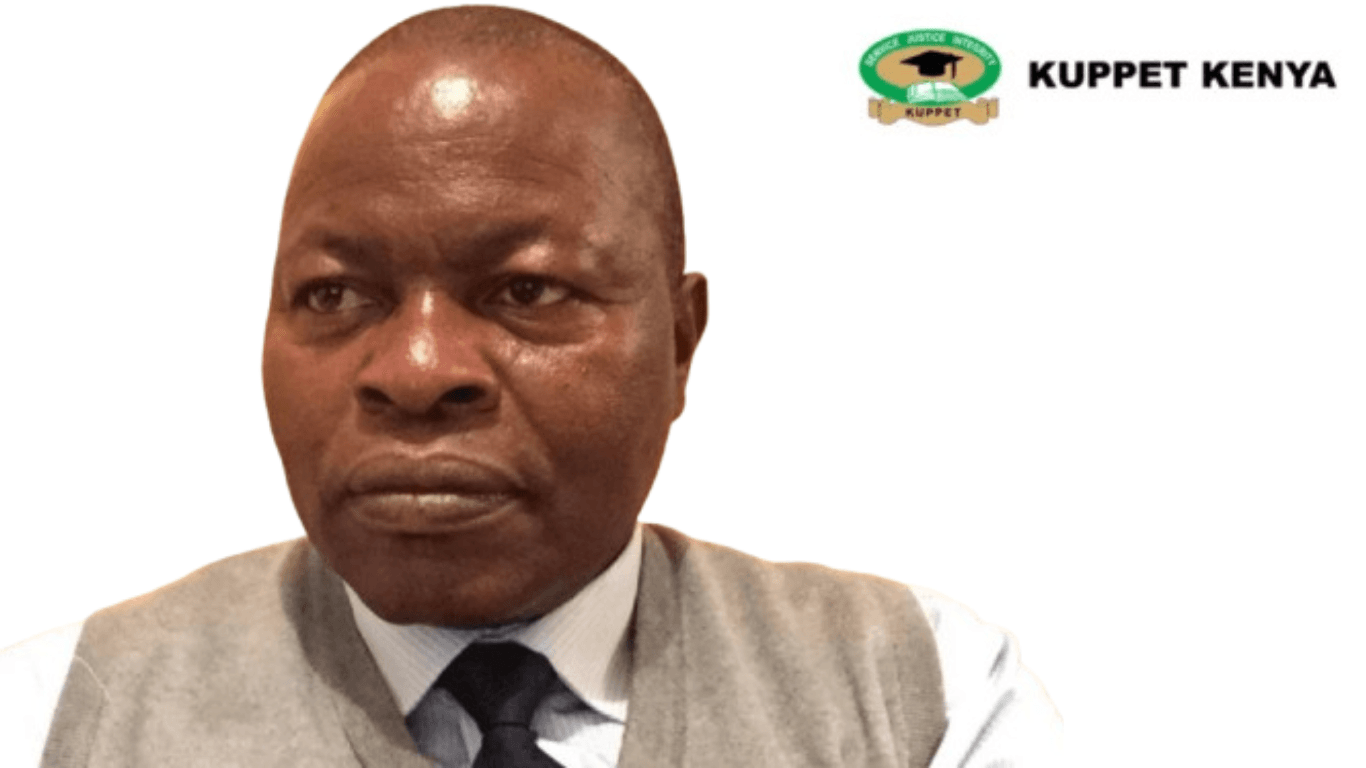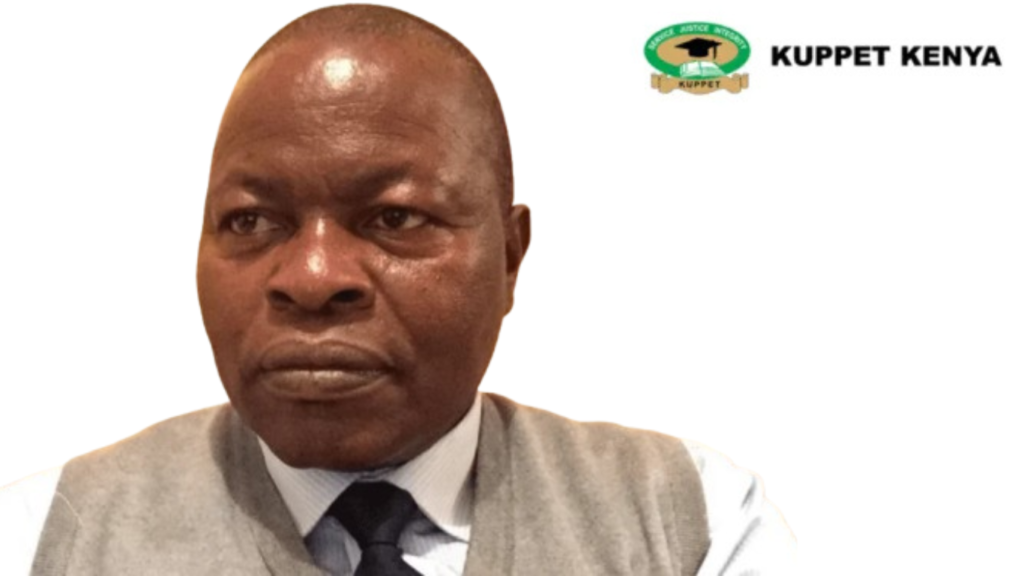KUPPET’S Demands on the 20,000 New JSS Posts to be Advertised by TSC Next Week

SG of KUPPET

KUPPET’S Key Demands for the Recruitment Process
The Kenya Union of Post-Primary Education Teachers (Kuppet) has articulated several critical demands regarding the recruitment process for the 20,000 new junior secondary school (JSS) teaching positions to be advertised by the Teachers Service Commission (TSC). One of Kuppet’s primary focuses is the urgent need to prioritize the recruitment of science and math teachers in line with the objectives of the Competency-Based Curriculum (CBC). The CBC emphasizes the importance of STEM subjects, which are vital in addressing the current educational gap in science and mathematics. Therefore, Kuppet advocates for the TSC to align the recruitment strategy, particularly for the upcoming TSC science and math teacher recruitment in 2024, with these educational goals.
Additionally, Kuppet is pressing for the inclusion of permanent and pensionable employment terms as part of the teacher recruitment package. This demand stems from a broader concern about job security and the sustainability of teaching careers. In contrast to previous practices that relied heavily on temporary contracts, Kuppet argues that permanent positions would not only attract qualified candidates to the newly advertised JSS posts but also encourage them to invest more fully in their professional development and the quality of education they provide. Such terms would contribute significantly to the professional stability of JSS teachers, directly influencing their performance and, ultimately, student outcomes.
Furthermore, KUPPET is advocating for increased transparency in the recruitment process to ensure equity and fairness. They demand that the TSC establish clear guidelines and publicly accessible application criteria for the JSS teacher recruitment set for October 29, 2024. By doing so, KUPPET aims to mitigate potential nepotism and ensure that all qualified candidates have an equal opportunity to secure junior secondary science teacher jobs in Kenya. This transparency is essential for maintaining public trust in the recruitment process and affirming the union’s commitment to advocating for JSS teacher rights.
Insights from KUPPET’S Secretary-General Akello Misori
Akello Misori, the Secretary-General of KUPPET, recently shed light on the ongoing discussions surrounding the impending recruitment of 20,000 new junior secondary school (JSS) teaching positions by the Teachers Service Commission (TSC). He emphasized the necessity for a structured and equitable recruitment process that ensures transparency and fairness in the selection of candidates for these new positions. Misori asserted that such an approach is critical not only for maintaining the integrity of the education system but also for enhancing teacher morale, especially among those applying for science and math teacher recruitment in 2024.
KUPPET plays a vital advocacy role in negotiating improved employment terms for JSS teachers. Misori noted that the union is actively engaged in discussions with TSC officials to advocate for better conditions for educators, ensuring their rights are protected and maintained during the recruitment process. He expressed concern over the existing disparities in employment terms, especially when comparing KUPPET and TSC stipulations for teacher employment. This dialogue aims to address issues such as job security and career advancement, specifically for JSS teachers facing the reality of a teacher shortage in Kenya.
Furthermore, Misori encouraged qualified individuals, particularly those with backgrounds in STEM, to apply for the upcoming JSS teacher recruitment on October 29, 2024. He reiterated Kuppet’s commitment to supporting qualified candidates in securing these vital teaching roles, which are pivotal in addressing the Kenya JSS teacher shortage solutions. By promoting these positions, Kuppet aims to ensure the education sector is equipped with competent teachers, ready to inspire and educate the youth of Kenya while emphasizing the need for union advocacy for JSS teacher rights.
Implications of KUPPET’S Demands for Education in Kenya
The educational landscape in Kenya is currently at a pivotal juncture, heightened by Kuppet’s demands in light of the 20,000 new Junior Secondary School (JSS) teaching positions to be advertised by the TSC. These demands aim to address the ongoing challenges arising from a notable shortage of qualified STEM (Science, Technology, Engineering, and Mathematics) teachers, which is critical for the country’s advancement. The TSC science and math teacher recruitment in 2024 will play a crucial role in addressing this gap, ensuring that students receive a robust foundation in essential subjects.
By fulfilling Kuppet’s demands, the quality of STEM education in Kenya is likely to improve significantly. This is particularly important given the increasing global emphasis on science and math curricula, which are integral to educating a workforce prepared for the demands of a technology-driven economy. Enhanced training and recruitment practices could lead to an engaged pool of educators, equipped with the skills necessary to effectively teach junior secondary science teacher jobs in Kenya. This not only benefits students through improved learning outcomes but also contributes to cultivating a generation poised to meet the economic needs of the future.
Furthermore, union advocacy for JSS teacher rights is anticipated to influence future recruitment practices. By negotiating better employment terms and addressing teacher concerns, Kuppet may foster an environment where job satisfaction is prioritized. Increased satisfaction among educators can lead to reduced staff turnover, which is a concern in many educational institutions, ultimately resulting in more consistent learning experiences for students.
In essence, Kuppet’s demands serve as a catalyst for meaningful reforms. By responding to these demands, stakeholders could enhance the motivation and morale of JSS teachers, thereby positively influencing student achievements and contributing to a more robust educational system overall.
What Aspiring JSS Teachers Should Know
As aspiring teachers prepare for the upcoming JSS teacher recruitment on October 29, 2024, it is imperative that they familiarize themselves with the application process as outlined by the Teachers Service Commission (TSC). This recruitment plan aims to fill the 20,000 new JSS teaching positions in Kenya, which have been a point of focus amidst the acute shortage of trained teachers in junior secondary schools. Candidates are therefore urged to be diligent in preparing their applications, ensuring they meet the qualifications stipulated by the TSC.
The application timeline begins with the advertisement on October 29, followed by a stipulated period for candidates to submit their applications. It is vital for prospective applicants to have all necessary documentation ready, including teaching certificates, academic transcripts, and identification papers, as incomplete applications will be automatically disqualified. Additionally, applicants should stay updated with any changes or specific requirements that TSC may announce during this recruitment cycle.
Furthermore, it is essential for applicants to recognize the role of the Kenya Union of Post Primary Education Teachers (Kuppet) in advocating for their rights. The union is actively pushing for enhanced employment terms under KUPPET vs TSC teacher employment terms discussions. Candidates seeking to understand their employment rights should consider engaging with Kuppet, which offers various resources, including workshops and informational sessions about navigating the recruitment process. Having union representation can provide additional support, especially in securing favorable working conditions and addressing any potential issues that may arise post-employment.
In addition to the recruitment specifics, applicants should also consider the long-term implications of their career choice, especially in the context of the Kenya JSS teacher shortage solutions. Being part of a strong union can empower them to contribute to collective bargaining efforts, ultimately improving their working environment and professional terms.




